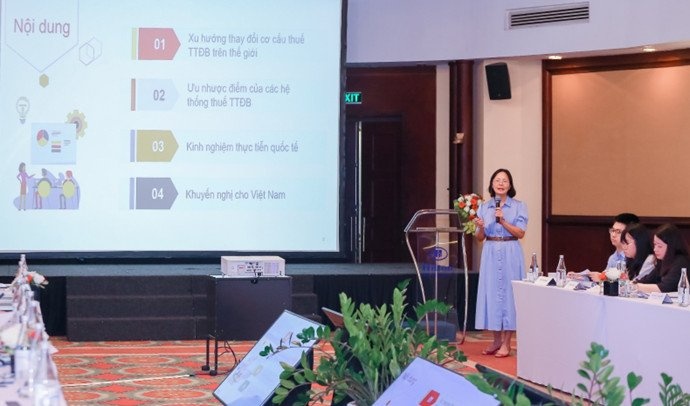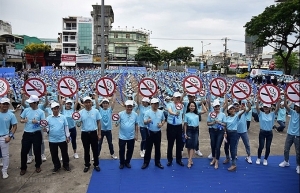Conference looks into optimal tax system for tobacco
The ideas were pushed forward at a conference titled Special Consumption Tax – Harmonising the State budget and Business Development held in Hanoi at the beginning of August.
The conference, which was organised by the Vietnam Tax Consultants Association (VTCA) and the Vietnam Chamber of Commerce and Industry (VCCI), aimed to solicit opinions from experts and businesspeople in order to meet the objectives set forth in the government's Decision No.508/QD-TTg, which was released in April and covers tax reforms through 2030.
 |
Addressing the conference, Dau Anh Tuan, deputy secretary-general of the VCCI, said that the special consumption tax (SCT) plays a role in orienting production and consumption in society.
However, the business community expected that any adjustments to the SCT should ensure a favourable investment climate. Thus, the government, citizens, and enterprises should all stand to gain from it, Tuan argued.
"A good excise tax involves a variety of elements like practicality, compliance, fair competition, reliability, and predictability in line with international trends," he said, adding that this is in addition to the basic goals of orienting consumers' behaviour and raising budget income.
Nguyen Thi Cuc, chairwoman of the VTCA, told the conference that the tax increase on tobacco products should follow a proper road map so that enterprises could adjust their operations and production would not suffer.
She also stressed it needs a suitable road map to raise taxes on tobacco so that manufacturers can adjust their operations to maintain business continuity and contribute to the local budget.
This not only limits the smuggling of cigarettes but also avoid revenue losses, thereby contributing to the protection of public health. This roadmap needs to take into consideration both timeline and tax rates.
“We believe that the revised plan should follow the road map, with the mixed tax method being applied in the first two years. That means in addition to the 75 per cent tax rate, the specific tax rate can be applied at VND1,000 (0.43 US cents) per pack. Then it will be increased gradually from to VND1,500 (0.65 US cents) per pack in the next two years. From the fifth year, it can be increased to VND2,000 (0.85 US cents),” Cuc said.
 |
According to Le Thi Thuy Van, deputy director of the Ministry of Finance’s Institute for Financial Strategy and Policy, there are diverse methods of imposing the SCT on tobacco like ad valorem excise, specific taxes, and mixed taxes.
Vietnam is applying ad valorem excise, which has many limitations. In particular, this approach had not kept pace with inflation and encouraged the proliferation of low-cost cigarettes on the market. It results in increased access to smoking among teenagers and higher rates of secondhand smoke exposure among children.
She noted that specific taxes and mixed taxes are now used in many countries thanks to numerous benefits. She recommended Vietnam also adopt the mixed tax structure. A roadmap is also required to ensure that the tax increase under the mixed tax structure keeps pace with inflation over time.
In the same vein, Dinh Thi Quynh Van, general director of PwC Vietnam, cited the data from the World Health Organization showing that the number of countries applying pure specific tax is the largest (66 countries), followed by mixed taxes (61 countries), and ad valorem tax (47 countries). Compared with nearly 15 years ago (2008), there has been an increase in the number of countries applying mixed tax structures.
She further noted that ad valorem tax can keep up with the increase in inflation. However, this method does not encourage production and quality improvement, which will increase selling prices. Meanwhile, enterprises had to bear a greater tax burden due to the multiplier effects of the ad valorem structure.
“It is necessary to reform the tax structure in the direction of encouraging quality improvement to reduce the adverse effects on health by switching to a mixed tax system and using absolute taxation to regulate the consumption market in a proper way,” she suggested.
If Vietnam surprisingly increases its SCT, it will become a tax burden. Vietnam may follow the footsteps of Malaysia, the UK, and Germany by abruptly raising its SCT.
The country will have to deal with more problems like the prevalence of illegal cigarettes, budget revenue losses, and failing to reduce the number of smokers. It may also drive many tobacco companies out of business and their employees unemployed.
 |
| According to Chairman of the Vietnam Tobacco Association Ho Le Nghia, the increase of excise tax, if any, should consider the harmony between state budget revenue and the development of production and business. The association recommended that law enforcement agencies should develop an appropriate roadmap and level of excise tax increase for tobacco products due to the fact that the Vietnamese market has many different price segments, avoiding creating opportunities for smuggled cigarettes, leading to tax revenue loss. |
He said that smuggled cigarettes are currently a serious problem in the cigarette market in Vietnam. The Vietnam Tobacco Association has supported and closely worked with anti-smuggling agencies from the central to local levels to promote the prevention of contraband cigarettes.
“The association proposes to the state and relevant agencies to apply stronger and more drastic measures and use part of the funds from the Tobacco Harm Prevention Fund to accelerate the fight against smuggled cigarettes, thereby increasing the budget revenue from the legal tobacco industry, instead of accelerating tax increases and imposing new fees on legal tobacco products," Nghia said.
Meanwhile, Young Jae Song, general director of the BAT-Vinataba JV, concurred with the adoption of the mixed tax method. However, the government should not increase the excise tax in the next one or two years to avoid any turbulence in the market and the rise of illegal cigarettes.
The SCT on new generation cigarettes should be taken into consideration. Vietnam has witnessed the growing popularity of imported new generation cigarettes. Market research reports estimate that about 1 per cent of male adults smoke new generation cigarettes in 2021, of which 90 per cent are electronic cigarettes.
Thus, Song suggested the government study the legal framework and the SCT rate for new generation cigarettes to regulate the quality and reduce the risks for consumers. This would create fair competition between new generation cigarettes and smuggled ones in the market, which would lead to revenue losses and health risks.
Participants agreed that a tobacco tax increase was necessary, but it was important to carefully and thoroughly study the road map and increases when drafting the law amendments to ensure that the tax policy would ensure harmony in the following issues: regulating budget revenues, protecting public health, reducing cigarette smuggling, and stabilising production and business.
 | Increase on special consumption tax vital to reduce smoking The new cigarette tax rate of VND5,000 (US$0.2) per pack will help reduce the rate of tobacco consumption and strengthen the State budget, health experts have said. |
 | SCT exemption for localisation Proposals on the special consumption tax exemption for locally-manufactured parts will be a key driver for automobile manufacturing and supporting industries to take flight with the help of the private sector. |
 | Vietnam will raise special consumption tax on cigarettes, beer, and spirits Cigarettes, beer, and spirits in Vietnam will be subject to an increased special consumption tax (SCT) aiming to improve community health and tackle the national budget deficit as part of a comprehensive tax reform strategy for 2030. |
What the stars mean:
★ Poor ★ ★ Promising ★★★ Good ★★★★ Very good ★★★★★ Exceptional
Related Contents
Latest News
More News
- Private capital funds as cornerstone of IFC plans (February 20, 2026 | 14:38)
- Priorities for building credibility and momentum within Vietnamese IFCs (February 20, 2026 | 14:29)
- How Hong Kong can bridge critical financial centre gaps (February 20, 2026 | 14:22)
- All global experiences useful for Vietnam’s international financial hub (February 20, 2026 | 14:16)
- Raised ties reaffirm strategic trust (February 20, 2026 | 14:06)
- Sustained growth can translate into income gains (February 19, 2026 | 18:55)
- The vision to maintain a stable monetary policy (February 19, 2026 | 08:50)
- Banking sector faces data governance hurdles in AI transition (February 19, 2026 | 08:00)
- AI leading to shift in banking roles (February 18, 2026 | 19:54)
- Digital banking enters season of transformation (February 16, 2026 | 09:00)

 Tag:
Tag:



















 Mobile Version
Mobile Version